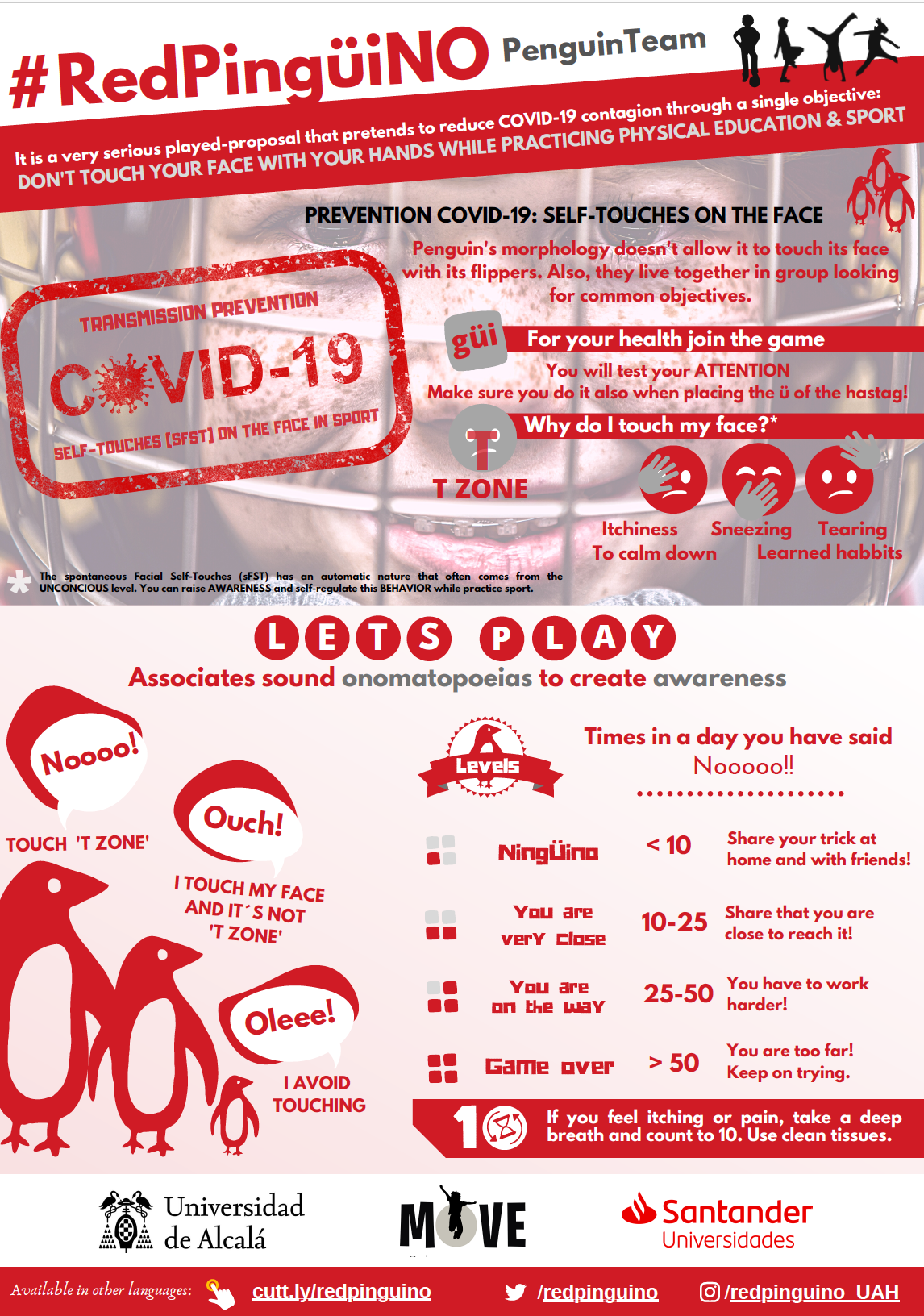Tackling the spontaneous Facial Self-Touches (sFST) in sport
The global pandemic due to COVID-19 has required restrictive measures. Social distancing, hand washing and avoiding touching your face are fundamental preventive measures established by the WHO.
Spontaneous Facial Self-Touches (sFST) and sport
Spontaneous Facial Self-Touches (sFST) are actions of contextual self-regulation carried out with limited awareness(1), a certain automatic nature, frequency and dependent on the emotional and cognitive level(2). Medical organizations have determined the relevance of the infection through the contact of the hands with the mucous areas of the face. However, there are no support and disclosure programs that establish mechanisms to regulate this behavior, reduce it or avoid it, as occurs with other preventive measures, such as hand washing. There are three groups of touches and triggers: touches by notice (with prior notice: itching, sweating, tickling, hair, blemishes, and tearing), gestures learned (without prior notice, and triggering situation: communicative or cultural, such as flirting and hand on chin while listening or waiting) and touches of compensation (from the emotional level and context in order to calm us down). The sFST are common in sports, whether due to context, emotions, tension, ritual, tics, or simply due to sweat. These behaviors on the area of T mucus (mouth-nose-eyes) or nearby areas are risk behaviors for transmission of the virus.
Prevention of SARS-CoV-2 virus transmission and sFST in sport
Sport hinders compliance with basic preventive regulations established by health authorities(3). Interpersonal contact, use of implements and materials, limited social distancing, hand washing and difficulty in using a mask can favor the transmission of the virus, even more in grassroots sport, so protocols and preventive strategies must be established to guarantee safety of athletes. The control of sFST in sport should be trained through habits to block, deviate or perceive the act and bring action to awareness and self-regulation through attention and anticipation, from the perception of movement(4). Therefore, to inhibit sFST, heuristics must be applied, through specific interventions and avoiding errors of omission with signals and reminders, highlighting the use of “if-then plans” and substitute or alternative behaviors, developing a mental model and an adequate progressive brain reorganization(5).

#RedPingüiNO
In conclusion, the RedPingüiNO is developed as a tool to prevent transmission of SARS-CoV-2, focused on the sFSTs through a serious game. The objective of the project is to establish an intervention based on neuroscience in the educational, sports and learning field that allows people and athletes to become involved in self-regulation and activate the reflective capacity of movement to avoid these gestural patterns and develop safe behavior.
Authors names & affiliations
Marta Arévalo-Baeza1, Pablo Sotoca Orgaz1, Alejandro Viuda-Serrano1, Iván Asín-Izquierdo2
- Department of Education Sciences, Faculty of Medicine and Health Sciences, University of Alcalá, Madrid, Spain.
- Department of Biomedical Sciences, Faculty of Medicine and Health Sciences, University of Alcalá, Madrid, Spain.
Address for reprint requests / corresponding author:
Email: marta.arevalo@uah.es
Marta Arévalo-Baeza: 0000-0002-1942-9128 – @lacajonera
Pablo Sotoca-Orgaz: 0000-0001-5032-0131 – @PabloSotoca
Alejandro Viuda-Serrano: 0000-0002-4951-0656 – @aviudaserrano
Iván Asín-Izquierdo: 0000-0002-0541-2050 – @Ivan_Asizq
Acknowledgements: The authors wish to thank the University of Alcalá for their collaboration and action in the COVID-19 pandemic. This project has obtained a recognition diploma from the University of Alcalá, a distinction for its contribution to alleviating the situation caused by COVID-19. The authors also want to thank all the people and experts who have collaborated in the development and dissemination of the project.
Competing interests: No, there are no competing interests for any author.
Funding: This work was supported by the research project COVID-19 UAH 2019/00003/016/001/019 funded by the Universidad de Alcalá and Santander Universidades.
REFERENCES
(1) Grunwald M, Weiss T, Mueller S, Rall L. EEG changes caused by spontaneous facial self-touch may represent emotion regulating processes and working memory maintenance. Brain Res 2014;1557(1):111-126. https://doi.org/10.1016/j.brainres.2014.02.002
(2) Mueller SM, Martin S, Grunwald M. Self-touch: Contact durations and point of touch of spontaneous facial self-touches differ depending on cognitive and emotional load. PLoS ONE 2019;14(3):e0213677. https://doi.org/10.1371/journal.pone.0213677
(3) Corsini A, Bisciotti GN, Eirale C, Volpi P. Football cannot restart soon during the COVID-19 emergency! A critical perspective from the Italian experience and a call for action. Br. J. Sports Med 2020. Epub ahead of print. https://doi.org/10.1136/bjsports-2020-102306
(4) West R, Michie S, Rubin GJ, Amlôt R. Applying principles of behaviour change to reduce SARS-CoV-2 transmission. Nat Hum Behav 2020;4(1):451–459. https://doi.org/10.1038/s41562-020-0887-9
(5) Sax H, Clack L. Mental models: A basic concept for human factors design in infection prevention. J. Hosp. Infect 2015;89(4):335-339. https://doi.org/10.1016/j.jhin.2014.12.008